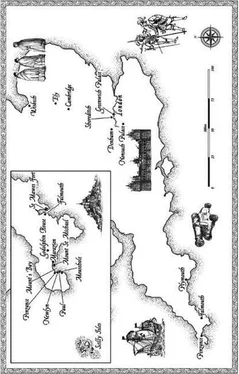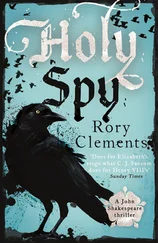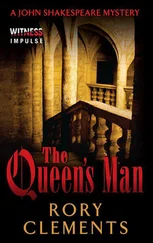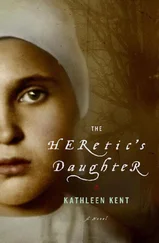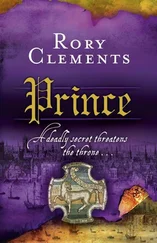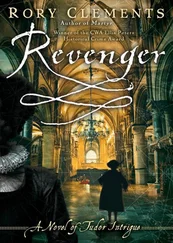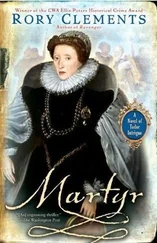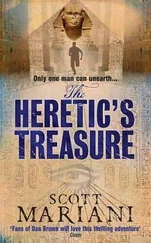Rory Clements - The Heretics
Здесь есть возможность читать онлайн «Rory Clements - The Heretics» весь текст электронной книги совершенно бесплатно (целиком полную версию без сокращений). В некоторых случаях можно слушать аудио, скачать через торрент в формате fb2 и присутствует краткое содержание. Год выпуска: 2013, Издательство: John Murray, Жанр: Исторический детектив, на английском языке. Описание произведения, (предисловие) а так же отзывы посетителей доступны на портале библиотеки ЛибКат.
- Название:The Heretics
- Автор:
- Издательство:John Murray
- Жанр:
- Год:2013
- ISBN:нет данных
- Рейтинг книги:3 / 5. Голосов: 1
-
Избранное:Добавить в избранное
- Отзывы:
-
Ваша оценка:
- 60
- 1
- 2
- 3
- 4
- 5
The Heretics: краткое содержание, описание и аннотация
Предлагаем к чтению аннотацию, описание, краткое содержание или предисловие (зависит от того, что написал сам автор книги «The Heretics»). Если вы не нашли необходимую информацию о книге — напишите в комментариях, мы постараемся отыскать её.
The Heretics — читать онлайн бесплатно полную книгу (весь текст) целиком
Ниже представлен текст книги, разбитый по страницам. Система сохранения места последней прочитанной страницы, позволяет с удобством читать онлайн бесплатно книгу «The Heretics», без необходимости каждый раз заново искать на чём Вы остановились. Поставьте закладку, и сможете в любой момент перейти на страницу, на которой закончили чтение.
Интервал:
Закладка:
He followed the corporal into the outer courtyard. Striding purposefully ahead of them, he caught sight of a small knot of courtiers, among them Essex. His former employer was looking in the other direction, but nonetheless Roag hurried by, head down, gaze averted.
There was a delightful intimacy about the inner courtyard of Nonsuch Palace, which made it perfect for the performing of entertainments on a warm summer’s evening such as this.
A mighty noise of talking, laughter and music already filled the balmy air. The sun was low, and there were long shadows, but pitch torches and lanterns added lustre to the space. Scores of courtiers stood or sat or milled about, conversing and arguing. At the far end of the courtyard, beneath the windows of the Queen’s Privy Chamber, a bank of seats had been erected for Her Majesty and her private party, protected from the weather by a large canopy of gold and green stripes. Directly opposite it, ranged behind the central fountain, was a low stage where a company of tumblers flipped their lithe and graceful bodies through the air.
The Queen was already in her place, seated on sumptuous cushions, idly sipping at a silver goblet of hippocras, watching the gymnasts and listening to some scandalous tittle-tattle that Henry, Lord Hunsdon, the Lord Chamberlain, dripped into her ear. Suddenly she laughed and struck him with the edge of her fan.
Essex sat on her right, his face imperiously sullen as he talked with Southampton. Cecil and his father, Lord Burghley, were seated near by, as were Heneage, Egerton and Puckering. Most of England’s senior nobles and holders of the offices of state were here for the occasion. The entertainment did not interest them a great deal; their real purpose this evening was to jostle for favour and preferment while doing their rivals down.
From the window of their appointed tiring room, Roag looked out and noted the positions of these men who held England in their fists. Each of his players had his task; each knew whom he was to kill first. At the sign — the utterance of the word Nonsuch — he would lunge forward and strike Essex to the ground; Paget would kill Sir Robert Cecil, and Ratbane would see to frail Burghley. The Irishmen, Seamus and Hugh Fitzgerald, had orders to slaughter Southampton and Egerton, then turn on Puckering and Heneage. They would do the court in one by one, as many as God allowed.
And Beatrice? She would stab the Queen through the heart.
He spotted Richard Topcliffe, the white-haired torturer, crossing the courtyard, towards his Queen. Two guards appeared and shook their heads, turning him back. So Topcliffe was out of gaol; Roag laughed. He might be free, but it did not seem as though he was back in favour. It occurred to him, however, that Topcliffe could be dangerous. Despite his years, he was strong and deadly. Given the chance, he would delight in playing the man of action here. Well, Roag would not give him the chance. After Essex, he would attack the white dog.
In the second tier of seats, he saw his patrons, the four ladies. What would he have done without such useful, hapless fools? They had been his passport to this occasion; he doubted they would enjoy the evening.
John Shakespeare blacked out and slid from his horse two miles short of Nonsuch, crunching down on his shoulder. The pain shook him back to groggy consciousness. He rose to his hands and knees and tried to gather his thoughts.
Boltfoot dismounted instantly and knelt at his side. ‘Master, you cannot go on.’
‘I must.’
‘I will go alone.’ Boltfoot turned to Hooft, who had also reined in. ‘Mr Hooft, stay here with Mr Shakespeare. If you can summon help, do so, but do not let him try to follow. I will return for you both when I can.’
Shakespeare nodded. ‘You are right, I slow you down. Go, Boltfoot. Ride!’
Boltfoot remounted his horse and kicked on into a canter. The going was easy from here, lush countryside and parkland. He should be at Nonsuch within ten minutes, God willing.
They were ready. Every man primed: ready to kill and die. They were in their court costumes, each man attired as an English hero of Elizabeth’s long reign. The words were well learnt; they would declaim in turn, and act out the great events of the past thirty-seven years, until the audience was lulled and unprepared, and the guards dozing. Roag was Burghley in his red velvet gown, his black, ermine-lined cape, his black velvet hat and his white staff of office. His deadly white staff.
The likeness of Drake was there, Essex and Hatton, too, Leicester and Sidney. And all with masks of gold and swords of finest Toledo steel hidden in their wooden toys. With hearts of iron, they walked from the tiring-house, through a series of passageways to the back of the stage. They waited until, at a signal from the Master of Revels, they strode out and took their bow. This was the beginning; they would say their lines of poetry, act out their parts, until the fell moment came that they would descend upon their enemies like wolves. Surprise would win them the day. In battle, surprise was everything.
Leading his companions, Regis Roag took his bow, then looked up, ready to embark on his great enterprise. But instead of an appreciative audience, agog with anticipation, he was faced with two solid lines of soldiers, separating them from their quarry. Two lines of men armed with swords, hagbuts and crossbows.
‘You will drop your weapons!’ a captain called, marching towards them. ‘Drop them now, then fall to your knees with your hands above your heads.’
Roag looked about him at his five gold-masked companions, all staring at him through the eye-slits in their vizards, desperate for guidance. This was not how it was supposed to be. He drew his thin rapier from the white stick of office.
‘Nonsuch!’ he shouted. ‘Attack!’
He drove forward, sword held out like a lance. Around him he heard the twang and whisper of a dozen crossbow bolts. Beatrice lunged forward at his side and crumpled with a dull gasp, a bolt embedded in her chest. Roag launched himself at the middle of the line of soldiers, roaring and snarling like a great cat of the Africas. The shock and ferocity of his charge tore the soldiers apart at their very heart, and he pushed through, stabbing at one with his rapier and ripping the short sword from his hand. And then he was there, facing his foe, the entire royal court of England, all now standing, looking at him in astonishment. He hesitated, suddenly overwhelmed with the power that lay in his hands.
Unsheathing their swords, the Queen’s senior courtiers ran down the steps from the royal gallery to confront him. All of them — Essex, Southampton and the rest — were skilled swordsmen, having studied the art since early childhood. He had no hope against any of them. The soldiers at his back had already turned on him. He glanced this way and that, rapier in one hand, short sword in the other. He saw that his band — the Fitzgerald brothers, Paget, Ratbane, Beatrice — had all fallen, riddled with bolts or hacked down with swords. Roag was alone. His eyes fell upon the four women whose pass had gained him entrance to this place. They were but two paces away.
As a sword-thrust came at him from a soldier, he lurched sideways, dropped the rapier and grasped the wrist of the nearest woman, Lady Lucia Trevail.
A strong man with the rage of battle in him, he dragged her into the crook of his arm and thrust the short sword at her heart so that it slashed into her damson and gold gown and nicked her flesh. ‘Stay back or she dies!’
They did hold back and he began to inch away from them. Roag’s only hope now was escape, yet it was slender enough with a dozen or more soldiers and courtiers advancing on him.
Lucia struggled against him, but his arm was curled tight about her throat. He pulled her back into the outer courtyard, then increased his pace, wrenching her into a stumbling backward run towards the gatehouse.
Читать дальшеИнтервал:
Закладка:
Похожие книги на «The Heretics»
Представляем Вашему вниманию похожие книги на «The Heretics» списком для выбора. Мы отобрали схожую по названию и смыслу литературу в надежде предоставить читателям больше вариантов отыскать новые, интересные, ещё непрочитанные произведения.
Обсуждение, отзывы о книге «The Heretics» и просто собственные мнения читателей. Оставьте ваши комментарии, напишите, что Вы думаете о произведении, его смысле или главных героях. Укажите что конкретно понравилось, а что нет, и почему Вы так считаете.
